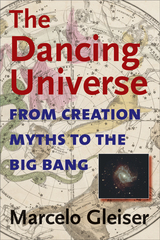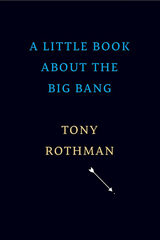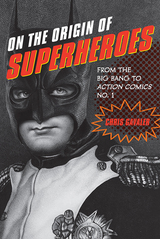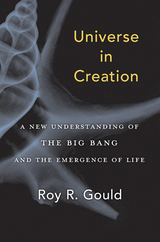

A concise introduction to the greatest questions of modern cosmology.
What came before the big bang? How will the universe evolve into the future? Will there be a big crunch? Questions like these have no definitive answers, but there are many contending theories. In A Little Book about the Big Bang, physicist and writer Tony Rothman guides expert and uninitiated readers alike through the most compelling mysteries surrounding the nature and origin of the universe.
Cosmologists are busy these days, actively researching dark energy, dark matter, and quantum gravity, all at the foundation of our understanding of space, time, and the laws governing the universe. Enlisting thoughtful analogies and a step-by-step approach, Rothman breaks down what is known and what isn’t and details the pioneering experimental techniques scientists are bringing to bear on riddles of nature at once utterly basic and stunningly complex. In Rothman’s telling, modern cosmology proves to be an intricate web of theoretical predictions confirmed by exquisitely precise observations, all of which make the theory of the big bang one of the most solid edifices ever constructed in the history of science. At the same time, Rothman is careful to distinguish established physics from speculation, and in doing so highlights current controversies and avenues of future exploration.
The idea of the big bang is now almost a century old, yet with each new year comes a fresh enigma. That is scientific progress in a nutshell: every groundbreaking discovery, every creative explanation, provokes new and more fundamental questions. Rothman takes stock of what we have learned and encourages readers to ponder the mysteries to come.

From the creation of the universe, through mythological heroes and gods, to folklore, ancient philosophy, revolutionary manifestos, discarded scientific theories, and gothic monsters, the sweep and scale of the superhero’s origin story is truly epic. We will travel from Jane Austen’s Bath to Edgar Rice Burroughs’s Mars to Owen Wister’s Wyoming, with some surprising stops along the way. We’ll meet mad scientists, Napoleonic dictators, costumed murderers, diabolical madmen, blackmailers, pirates, Wild West outlaws, eugenicists, the KKK, Victorian do-gooders, detectives, aliens, vampires, and pulp vigilantes (to name just a few). Chris Gavaler is your tour guide through this fascinating, sometimes dark, often funny, but always surprising prehistory of the most popular figure in pop culture today. In a way, superheroes have always been with us: they are a fossil record of our greatest aspirations and our worst fears and failings.

We know the universe has a history, but does it also have a story of self-creation to tell? Yes, in Roy R. Gould’s account. He offers a compelling narrative of how the universe—with no instruction other than its own laws—evolved into billions of galaxies and gave rise to life, including humans who have been trying for millennia to comprehend it. Far from being a random accident, the universe is hard at work, extracting order from chaos.
Making use of the best current science, Gould turns what many assume to be true about the universe on its head. The cosmos expands inward, not outward. Gravity can drive things apart, not merely together. And the universe seems to defy entropy as it becomes more ordered, rather than the other way around. Strangest of all, the universe is exquisitely hospitable to life, despite its being constructed from undistinguished atoms and a few unexceptional rules of behavior. Universe in Creation explores whether the emergence of life, rather than being a mere cosmic afterthought, may be written into the most basic laws of nature.
Offering a fresh take on what brought the world—and us—into being, Gould helps us see the universe as the master of its own creation, not tethered to a singular event but burgeoning as new space and energy continuously stream into existence. It is a very old story, as yet unfinished, with plotlines that twist and churn through infinite space and time.
READERS
Browse our collection.
PUBLISHERS
See BiblioVault's publisher services.
STUDENT SERVICES
Files for college accessibility offices.
UChicago Accessibility Resources
home | accessibility | search | about | contact us
BiblioVault ® 2001 - 2024
The University of Chicago Press









